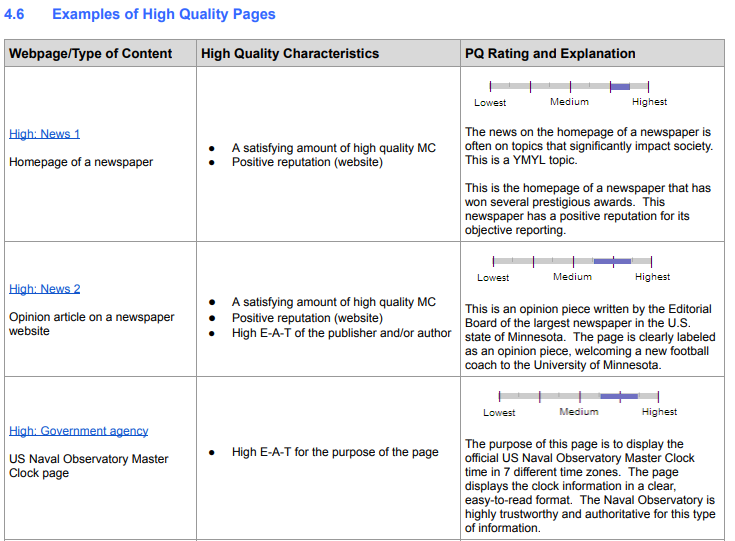One of my roles is to help Media Relations Agency’s clients improve their Search Engine Optimization (SEO) so they can rank higher in Google’s searches. Quality content has a high level of Expertise, Authoritativeness and Trustworthiness (E-A-T). The content is unique, easy to understand and serves the page’s purpose.
There’s a lot to consider if you expect to meet these requirements.
High-quality content, according to Google
While most aspects of Google’s ranking algorithm are secret, Media Relations Agency’s digital marketing team knows quite a bit about how Google defines quality. This is thanks to our thorough review and understanding of its Search Quality Evaluator Guidelines.
These guidelines are used by Google’s Search Quality Raters, employees who manually evaluate search results. The document outlines exactly what a high-quality page and high-quality content should look like.
We are also very familiar with past posts from the Google Webmaster Forum, written by the algorithm’s creators.
Based on these sources, here are questions to ask yourself when evaluating your digital content. If you’re passing through these questions without issue, odds are Google will consider your content high quality.
Content expertise:
- Would you trust the information presented in this article?
Make sure that you are only saying things that are true, and statements are substantiated. This can be done by linking to reputable internal and external sources, or by taking the time to thoroughly explain your position. We take this one step further by applying our Media Grade Content® guidelines to our clients’ digital content. Using the media’s preferred AP Style improves content’s credibility and impact. - Does this article contain insightful analyses or interesting information, beyond the obvious?
While our writers consistently produce content that is worthy of the audience’s time, many low-quality pages try to rank for keywords by having meaningless content. Avoid too much fluff content that simply restates the obvious. It does not stand out from other sites and isn’t very helpful to readers. - Is this article written by an expert or enthusiast who knows the topic well?
Show your expertise. Although you need to write at a level your audience will understand, don’t provide basic information. Take it one step further by adding your own analysis or by making connections with relevant topics. - Are the articles short, unsubstantial or otherwise lacking in helpful specifics?
Thin pages are rarely considered authoritative. Longer answers aren’t always better, but being thorough and having content that is well thought out builds your authority.
Content originality:
- Does the site have duplicate, overlapping or redundant articles on the same or similar topics?
Don’t copy others’ articles. This goes beyond legal issues such as plagiarism. While it’s okay to take inspiration from others’ work, put your own spin on it. Make a post with a unique structure and point. - Does the article provide original content or information, original reporting, original research or original analysis?
Drawing conclusions that other writers aren’t mentioning helps your content stand out from the rest. - Does this article provide a complete or comprehensive description of the topic?
Google knows that users don’t want to go to multiple pages to find an answer. A complete description helps people find information more efficiently, which is a big indication of quality content. - Is this the sort of page you’d want to bookmark, share with a friend or recommend?
Have engaging content with a unique angle that keeps visitors on your site. Think about pages that you’ve bookmarked or visited multiple times. Why do you keep returning? Use those pages as examples for how in depth to make your own content. - Does the page provide substantial value when compared with other pages in search results?
Most searches will yield millions of potential results, many of which will be very relevant to the search query. Ask yourself what the top search results are missing, and write about that. Don’t follow the same cookie cutter approach.
Content editing:
- Does this article have spelling, stylistic or factual errors?
Taking time to proofread your work shows your dedication to having high quality content.
Was the article edited well, or does it appear sloppy or hastily produced?
Avoid slang and partial sentences. Proper grammar and spelling go a long way towards proving your intelligence and expertise.
Aspects of High Quality Pages

Excerpt from the Google Quality Rater Guidelines Showing Examples of a High Quality Page
When trying to rank in Google, the quality of the main content is not the only piece that matters. Google will also consider your supplementary content, use of space, site reputation and availability of contact information.
Supplementary content includes additional information on the page that doesn’t directly help the page to achieve its purpose, but helps users to navigate the site. The most common examples of this are your menu, footer and sidebar.
Use of space has become less of an issue thanks to responsive web design, but reasonable spacing is necessary for a user to easily identify the page’s main content. The page shouldn’t have excessive blank spaces, and the main content shouldn’t be hidden in any way.
Reputation can be more difficult to evaluate, but a poor reputation can derail an otherwise well-written page.
Specifically, Google says:
“Reputation is an important criteria when using the [High Quality] rating, and informs the E-A-T of the page. While a page can merit the [High Quality] rating with no reputation, the [High Quality] rating cannot be used for any website that has a convincing negative reputation”
Contact information should be available on most quality pages, although it depends on the type of the website. Including this in your footer or header will suffice.
Avoiding low-quality content
There are many signals of low-quality to avoid. Luckily, most are specific to spam content, and you likely have no desire to include these in your site. Having low-quality content can give you a negative reputation. These include:
- Linking to malicious sites with viruses or phishing
- Filling the page with incredibly large pictures or excessive ads that pose a distraction
- Pages without any meaningful content
- Hacked pages
- Extreme keyword stuffing or fluffing content. This includes hiding in the background, and taking a full paragraph to explain a concept that could be completed in four words, etc.
Creating quality content takes time, but it is the fuel that drives marketing and will keep people coming back to your site or company.
If your current content creation strategy isn’t producing quality content, our content marketing writers could help. Our Media-Grade Content gets you noticed, tells your story and compels your audience to take action. Call us at 952-697-5269 or use this form.








